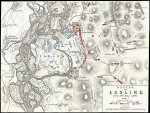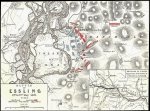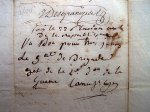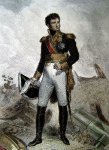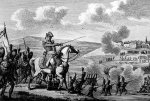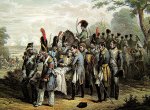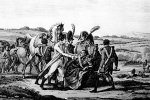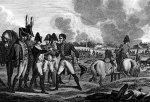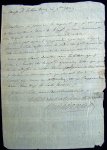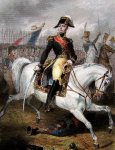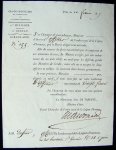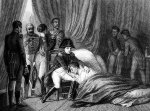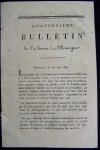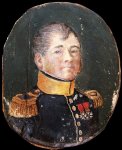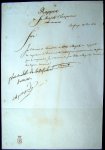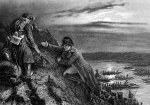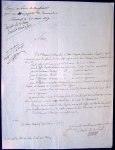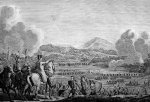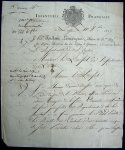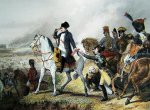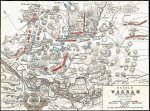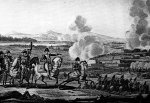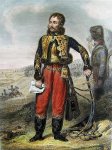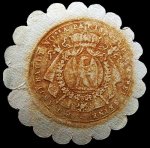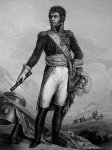Aspern-Essling
Napoleon’s orders were simple, build a bridge over the Danube, then march on the Austrians, but this was not going to be an easy task. Massena was sent to Kaiser-Ebersdorf to build a bridge over the Danube, while Lannes went to Nubdorf where he would build a bridge to deceive the Austrians. With the deception underway, Lannes sent some grenadiers over the Danube in boats to scout enemy positions. This was a big mistake on his part, because the Austrians pounded them and left many dead. After trying to convince the Austrians that Nubdorf was the main crossing, Lannes joined the main army at Kaiser-Ebersdorf on the 19th of May.
His first task was to recointre the Austrian positioned on the other side of the Danube. Lannes, Massena, and Bessieres made the crossed after dark. After stumbling around trying to find the Austrians, they all had varied opinions on the enemy’s strength. On hearing the intelligence, Napoleon sent Lannes to the small Island of Lobau where he spent the night admist campfires.
On the 21st of May, Lannes crossed the second leg of the Danube and joined Massena. Lannes received orders to march on Essling with Boudet, while Massena went to Aspern and Bessieres occupied the center. Once in position at Essling, Archduke Charles sent down Fray and Rosenberg with 11,000 Austrians with a cover of 42 cannons, leaving the French vastly outnumbered at Essling. During the first day of battle, Lannes lost two friends in De Albuquerque and Espagne.
On the 22nd of May, Lannes attacked the Austrian center with Boudet, Clararede, Oudinot, and St. Hilaire. The French beat back the enemy, but the Austrians unleashed their cannons, and St. Hilaire was wounded and had to be taken off the field. After a portion of the French bridge was destroyed, Napoleon ordered Lannes to hold his position. During this time the Austrians regrouped, and opened up their cannons on the remaining French. During the shelling Captain Viry was killed and many more wounded. With the French bridge partially destroyed and unable to send reinforcements, Napoleon ordered Lannes back to Lobau.
The Austrians aimed their guns on the small island and opened up with a terrible barrage of cannon. Lannes would lose another friend in Pouzet when a cannon ball cut him in two, which flung blood all over Lannes. Dazed by the event, he retreated to a ditch and sat down. While there he was hit by another cannon ball which smashed his legs. Lannes was carried off to a field hospital where surgeon Larrey looked over his wounds. Larrey made the decision to amputate his left leg and leave the right untouched. When Napoleon heard of the event, he immediately made his way to Lannes.
Napoleon found Lannes in dire straits which left him deeply concerned. During the brief visit, Napoleon was a different person, and when Napoleon left, his uniform was stained with the blood of Lannes. Lannes stayed the night on Lobau and then was taken to Kaiser-Ebersdorf. During the next days he was visited by many who all wept including Napoleon. On the 31st of May 1809, the Grenadier Jean Lannes died of fever.
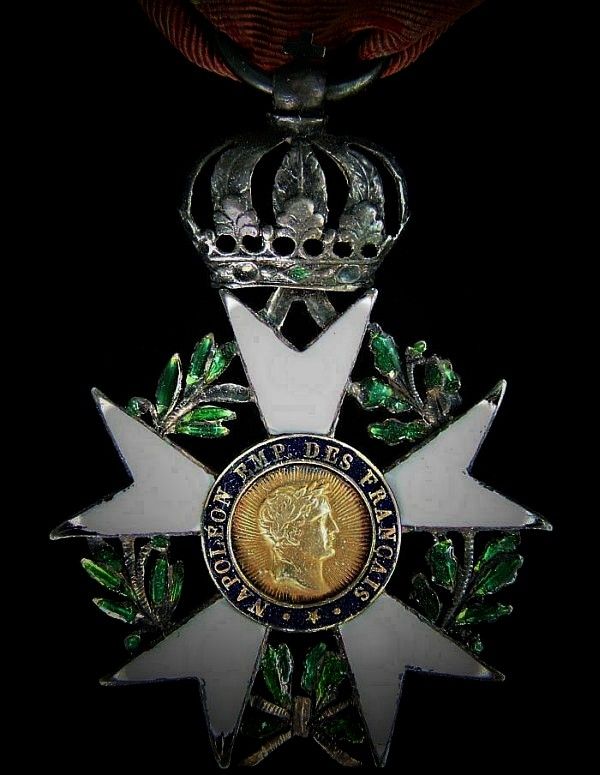
THE TIMES OF LONDON
June 9, 1809
THE TENTH BULLETIN OF THE GRAND ARMY
Ebersdorf, May 23
Opposite to Ebersdorf the Danube is divided into three branches, separated by two islands. The distance from the right bank to the island on that side, which is 140 toises in circumference, is about 1000 toises. The distance from the island to the greater is 120 toises, and here the stream runs with the greatest force.
The larger of the two islands, which is called In-der-Lobau, and the water which separates it from the main land, is 70 toises broad. The first villages which appear after crossing are Gross-Aspern, Essling, and Enzersdorf. The passage of such a river as the Danube, in the presence of an enemy well acquainted with all the local circumstances, and who has the inhabitants on his side, is one of the greatest military enterprises that can be imagined. The bridge over the arm of the river which separates the right bank from the first island, and the bridge from this island to that of In-der-Lobau, were erected on the 19th. MOLITOR’S division had been conveyed to the great island on the 18th by row-boats. On the 20th, the EMPEROR arrived on In-der-Lobau, and caused a bridge to be throw over the last arm of the Danube from that island to the left bank, between Gross-Aspern and Essling. The arm being not quite 70 toises broad, only 15 pontoons were required for the operation, which were fixed within three hours by Colonel AUBRY of the Artillery. Colonel St. Croix, Aide-de-Camp of Marshal Duke of RIVOLI, arrived first on the left bank, in an open boat, and General LASALLE’S division of light cavalry, with MOLITOR and BOUDET’S divisions, passed during the night.
Afterwards the EMPEROR, accompanied by the Prince of NEUFCHATEL, the Dukes of RIVOLI and MONTEBELLO, examined the position of the left bank, and determined the field of battle, posting the right on the village of Essling, and the left on the village of Gross-Aspern. Both villages were garrisoned at the same time. On the 21st, at four in the afternoon, the enemy’s army shewed itself, and appeared to have for its object to defeat our vanguard, and to drive it into the river. Vain enterprise! The Duke of RIVOLI was the first attacked at Gross-Aspern, by the corps of General BELLEGARDE. He manoeuvred with the divisions of MOLITOR and LEGRAND, and rendered completely abortive all the attacks which the enemy made that evening. The Duke of MONTEBELLO defended the village of Essling, and the Duke of ISTRIA covered the plain with the light cavalry and ESPAGNE’S division of cuirassiers, protecting at the same time Enzendorf. The contest was severe, the enemy having 200 pieces of cannon and 90,000 men, collected from the remains of all the Austrian corps. D’ESPAGNE’S division of cuirassiers, which made several fine charges, advanced in two squares, and took 14 pieces of cannon, but a ball killed General D’ESPAGNE while fighting gloriously at the head of his troops. He was a brave man, and in every respect eminent and praise worthy. The General of Brigade FOULERS was was likewise killed in a charge. General NANSOUTY arrived in the evening on the field of battle, with the single brigade commanded by General ST. GERMAIN, and distinguished himself by several brilliant charges. At eight o’clock the action terminated , and we remained masters of the field. During the night, General OUDINOT’S corps, ST. HILAIRE’S division, two brigades of light cavalry, and the train of artillery, passed over the three bridges.
On the 22d the Duke of RIVOLI was the first engaged at four in the morning. The enemy made several successive attacks, in order to retake the village. At last the Duke of RIVOLI, tired of acting on the defensive, attacked the enemy in his turn, and threw them into confusion. General LEGRAND distinguished himself by the coolness and intrepidity which characterize him. The General of Division BOUDET was stationed at the village of Essling, and had orders to defend that important position. Observing that the enemy had a very wide space between his right and left wing, it was resolved to penetrate through the centre. The Duke of MONTEBELLO led the attack–General OUDINOT was on the left, ST. HILAIRE’S division was in the center, and BOUDET’S division was on the right wing. The enemy’s centre could not withstand the sight of our troops. In a moment every thing was borne down before them. The Duke of ISTRIA made several brilliant and successful attacks. Three columns of infantry were charged and cut down by the cuirassiers.
The Austrian army was on the point of being destroyed, when, at seven in the morning, an Aide-de-Camp of the EMPEROR came to inform him, that a sudden rise in the Danube had sent afloat a great number of trees, which were cut down during the late events at Vienna, and rafts which had been left on the bank; and that the bridges which formed the communication between the right bank and the little island, and between the little island and that of In-der-Lobau, had thereby been carried away. This rapid swell which usually does not take place until the middle of June on the melting of the snow, has been accelerated by the great heat which has for some days prevailed.–All the reserve parks of artillery which were advancing, were by the loss of the bridges detained on the right bank, as was also part of our heavy cavalry, and the whole of the Duke of AUERSTADT’S corps. This dreadful accident induced the EMPEROR to put a stop to the movement in advance.
He ordered the Duke of MONTEBELLO to keep the field of battle which had been recognized, and then to take his position with his left wing resting, on a curtain-work which the Duke of RIVOLI covered, and his right wing at Essling. The artillery and infantry cartridges which were in our reserve park, could not now be brought across the river. The enemy was in a most frightful state of disorder at the moment when he learned that our bridges were broken down. The slackening of our fire, and the concentrating movement of our army, soon left him no doubt respecting this unforeseen accident. All his cannon and artillery equipage which were before on the retreat, were again drawn out in line, and from nine in the morning to seven in the evening, he made the most astonishing exertions, supported by the fire of 200 pieces of cannon, to throw the French army into disorder; but all his efforts tended to his own disgrace. Thrice he attacked the villages of Essling and Gross-Aspern, and thrice him filled them with his dead. The Fusileers of the Guard, commanded by General MOUTON, acquired great glory; they defeated the reserve, formed of all the Grenadiers of the Austrian army, and the only fresh troops which remained to the enemy.
General GROS put to the sword 700 Hungarians, who had succeeded in entrenching themselves in the Church-yard of Essling. The Tirailleurs, under the command of General CURIAL, performed their first service this day, and proved that they possessed courage. General DORSENNE, Colonel Commanding the Old Guard, posted his troops in the third line, forming a brazen wall, which was alone capable of withstanding all the efforts of the Austrian army. The enemy discharged 40,000 cannon shot against us, while we, deprived of our reserve parks, were under the necessity of sparing our ammunition lest some other unforeseen events should occur. In the evening the enemy returned to his old position, which he had left previous to the commencement of the attack, and we remained masters of the field. His loss is very great: it being estimated by the most experienced officers that he left more than 12,000 dead on the field. According to the reports of the prisoners, the enemy have had 23 Generals and 60 Superior officers killed or wounded. Lieutenant Field Marshal WEBER, 1,500 men, and four standards have fallen into our hands. Our loss has also been considerable. We have 1,100 killed, and 3,000 wounded.
The Duke of MONTEBELLO was wounded by a cannon ball in the thigh, at six o’clock in the evening of the 22d; but an amputation has taken place, and his life is out of danger. At first it was thought that he was killed, and being carried on a hand barrow to where the EMPEROR was, his adieu was most effecting. In the midst of all the anxieties of the day, the EMPEROR gave himself up to the expression of that tender friendship which, during so many years, he has cherished for this brave companions in arms. Some tears rolled from his eyes, and turning to those surrounded him, he said–“My heart required a painful stroke like this, to make me have any other concern today than for my army.” The Duke of MONTEBELLO was senseless, but recovered himself in the presence of the EMPEROR: he embraced him and said–“Within an hour you will have lost him who dies with glory and the consolation of being your best friend.” The General of Division ST. HILAIRE, is also wounded: he is one of the first Generals of France. General DUROSNEL, Aide-de-Camp to the EMPEROR, was also killed by a cannon ball, while he was carrying an order. The soldiers displayed all that coolness and intrepidity which is peculiar to the French alone.
The waters of the Danube still increasing, the bridges of the Danube could not be restored during the night; the EMPEROR, therefore, ordered the army on the 23d, to pass the left bank across the little arm, and take a position on the Island of In-der-Lobau, protecting the tete-du-pont. The works for replacing the bridges are continued with assiduity, and nothing will be undertaken until they are secure, not only against any thing that may be attempted against the. The rise of the river, and the rapidity of the stream, render much labour and great caution necessary. On the morning of the 23d, when the army was informed that the emperor had ordered it to retreat to the great island, nothing could exceed the astonishment of the brave troops. Victorious on both days, they had supposed that the remainder of the army had joined them; but when they were told that the high water had carried away the bridges, and that its continued increase rendered a supply of their ammunition and provisions impractable, and that any movement in advance would be absurd, it was with difficulty they could be persuaded of the truth of the statement. That bridges constructed of the largest boats of the Danube, secured by double anchors and cables, should be carried away, was a great and entirely unforeseen disaster; bit it was extremely fortunate that the EMPEROR was not two hours later in being informed of it.
The army, in pursuing the enemy, would have exhausted its ammunition, which it would have been impossible to replace. On the 23d, a great quantity of ammunition was sent to the camp at In-der-Lobau. The battles at Essling, of which a circumstantial report shall be made, pointing out the brave men who distinguished themselves therein, will, in the eyes of posterity, be a new memorial of the glory and inflexible firmness of the French army. The Dukes of MONTEBELLO and RIVOLI on that day displayed all the powers of their military character. The EMPEROR had given the command of the 2d corps to Count OUDINOT, a General tried in a hundred battles, in which he has always evinced the possession of equal courage as skill.
“I am in great grief for the loss of the Duke of Montebello, who died
this morning. And so all things come to their end! Goodbye, dear
friend; do anything you can to console the Marshal’s poor wife.
There are some wounds to which death itself is preferable.
It is at the moment of leaving life that a man clings to it
with all his might, Lannes, the bravest of men…”
Napoleon to Josephine, May 31
THE TIMES OF LONDON
June 16, 1809
THE FOURTEENTH BULLETIN OF THE GRAND ARMY
Ebersdorf, June 1
The bridges upon the Danube are completely reestablished: to these have been added a flying bridge; and all the necessary materials are preparing for another bridge of floats. Seven machines are employed to drive in the piles, but the Danube being in many places 24 and 26 feet in depth, much time is spent in order to fix the anchors, when the machines use displaced. However, our works are advancing, and will be finished in a short time.
The General of Brigade of Engineers LAZOWSKI, is employed on the left bank upon the tete-de-pont of 1,600 toises in extent, and which will be surrounded by a trench full of running water. The 44th crew of the flotilla of Boulogne, commanded by the Captain de VAISSEAU BASTE, is arrived. A great number of boats, cruising in the river about the islands, protect the bridge and render great service. The battalion of marine workmen labour in the construction of little armed vessels, which will serve completely to command the river. After the defeat of the corps of General JELLACHIC, M. MATTHIEN, Captain Adjutant of the Staff of the Army of Italy, was sent with an orderly dragoon upon the road to Saltburgh, who having successively met with a column of 650 troops of the line, and column of 2,000 militia, both of whom were cut off, and had lost their way; they, on being summoned to surrender, laid down their arms. The General of Division LAURISTON is arrived at Oldenburgh, the first country town of Hungary, with a strong advanced guard. Three appears to be some ferment in Hungary, where mens minds are divided, the greater part of them not seeming favourable to Austia. The General of Division LASALLE had his head-quarters opposite to Besbourg, and pushes his posts to Altenbourg and Rhaab. Three divisions of the army of Italy are arrived at Neustadt. The Viceroy has been for the last two days at the head-quarters of the EMPEROR.
General MACDONALD, who command one of the army of Italy, has enterd Gratz. There have been found in this capital of Styria immense magazines of provisions, cloathing, and equipment of every kind. The Duke of DANTZIC is at Litz. The Prince of PONTE-CORVO is marching to Vienna. The General of Division VANDAMME, with the Wirtemburgers, is arrived at St. Polten, Mautern, and Crems. Tranquillity reigns in the Tyrol: cut by the movements of the Duke of DANTZIC and of the army of Italy, all the Austrians who had been engaged in that point have been destroyed; some by the Duke of DANTZIC, other, such as the corps of Jellachich, by the army of Italy. Those who were in Swabia had no other resource than to endeavour to cross Germany as partisans, directing their march by the Upper Palatinate. They formed a small column of infantry and cavalry, which, after escaping from Lindau, was met by Colonel REISET, of General BEAUMONT’S of observation. It was cut off at Neumarck; and the whole column, officers and soldiers, laid down their arms. Vienna is tranquil; bread and wine are in abundance; but meat; which this capital used to draw from the bottom of Hungary, begins to be scarce. Contrary to all reasons of policy and motives of humanity, the enemy do all in their power to starve their fellow citizens and this city, although it contains their wives and children. How different is this from the conduct of our HENRY IV, who supplied a city then hostile to, and besieged by him with provisions.
The Duke of MONTEBELLO died yesterday, at five in the morning. Shortly before, the EMPEROR passed an hour with him. His MAJESTY sent his Aide-de-Camp, RAPP, for Dr. FRANC, one of the most celebrated physicians in Europe. His wounds were in good condition, but a dangerous fever had made in the course of a few hours the most fatal progress. All the assistance of the art was useless. His MAJESTY has ordered that the body of the Duke of MONTEBELLO should be embalmed, and conveyed to France, there to receive the honours that are due to his elevated rank and eminent services. Thus died one of the most distinguished soldiers that France ever produced. In the many battles in which he was engaged, he had received thirteen wounds. The EMPEROR was deeply afflicted by his loss, which will be felt by all France.
“My Cousin: The Marshal died this morning of wounds received on the field
of honour. My sorrow is as deep as yours. I lose the most distinguished
general in my armies, my comrade in arms during sixteen years, he
whom I considered my best friend. His family and his children will
always have a special claim to my protection. It is to assure you of
this that I have written you this letter, for I am convinced that
nothing could lighten the grief that you must feel.”
Napoleon to Mme. Lannes, May 31
THE TIMES OF LONDON
July 22, 1809
THE TWENTY FIFTH BULLETIN OF THE GRAND ARMY
Wolkersdorf, July 8
The works raised by General BERTRAND, and the corps he commands, had, since the beginning of the month, entirely subdued the Danube. His MAJESTY instantly resolved to collect his forces in the Island of Lobau, open upon the Austrian army, and bring on a general engagement.
It was not because the position of the French army was not a very fine one at Vienna; master of the whole right bank of the Danube, having in his power Austria and a considerable portion of Hungary, he enjoyed the greatest plenty. If some difficulties had been experienced in providing sustenance for the people of Vienna, this arose from an ill organized administration, from embarrassments which were every day diminishing, and from difficulties which were naturally produced by the situation in which the country was placed, in a land in which the trade in corn is an exclusive privilege of the government. But how could the troops continue to be separated from the hostile army, by a canal of three or four hundred toises in breadth, when the means of passing over had been prepared and secured? This would have given credibility to the impostures which the enemy had scattered with so great profusion throughout his own neighbouring countries: this would have cast a doubt over the occurrences at Essling, and would. Finally, have authorized this supposition of there being, in fact, a substantial equality between armies so different, of which one was animated and in some measure reinforced by multiplied success and victories, while the other was dispirited by the most striking reverses.
All the intelligence concerning the Austrian army shewed that it was considerable; that it had been recruited by numerous bodies of reserve, by the levies from Moravia and Hungary, and by all the Landswehr of the provinces; that its cavalry had been remounted by requisitions in all the circles, and its draughts of artillery tripled by immense levies of horses and carriages in Moravia, Hungary, and Bohemia. To ass new chances in their favour, the Austrian Generals had raised military works, of which the right was protected by Gross-Aspern, and the left by Enzersdorf. The villages of Aspern, Essling, and Enxersdorf, and the intervals between them were covered by redoubts, surrounded by palisades and , and defended by more than 150 pieces of battering cannon, taken from the fortresses of Bohemia and Moravia. It was inconceivable how the EMPEROR, with his experience in war, could think of attacking works so powerfully defended, backed by an army estimated at 200,000 men, as well troops of the line as militia and new raised levies, and who were supported by 800 or 900 pieces of field artillery. It appeared more simple to throw some fresh bridges over the Danube, a few leagues lower down, and thus render useless the field of battle prepared by the enemy. But in this latter case it was not thought practicable to avert the inconveniences which had already nearly proved fatal to the army, and succeed in the course of two or three days in protecting these new bridges from the machines of the enemy.
On the other side the EMPEROR was tranquil. Works were raised upon works in the Island of Lobau; and several bridges on piles, and several rows of stockades, were fixed at the same place. This situation of the French army, placed between these two great difficulties, had not escaped the enemy. We was aware that his army, too numerous and unwieldy, would be exposed to certain destruction if he acted on the offensive: but, at the same time, he believed that it was impossible to dislodge him from the central position in which he covered Bohemia, Moravia, and a part of Hungary. It is true that the position did not cover Vienna, and that the French were in possession of the Capital. But this possession was, in a certain degree, disputed, since the Austrians remained masters of one bank of the Danube, and prevented the arrival of the articles most indispensable to the subsistence of so great a city. These were the reasons of hope and fear, and the subject of conversation in the two armies. On the 1st of July, at four o’clock in the morning, the EMPEROR removed his head-quarters to the Island of Lobau, which, had been already named by the engineers the Island of Napoleon.
A small island to which had been given the name of the Duke of MONTEBELLO, and which bore upon Enzersdorf, had been furnished with ten mortars and twenty 18 pounders. Another island, called Island ESPAGNE, had been supplied with six pieces of battering cannon(12 pounders), and four mortars. Between these two islands, a battery had been raised, equal in force to that of the Island MONTEBELLO, and in like manner bearing upon Enzersdorf. These 62 pieces of battering artillery had the same object, were in two hours, to destroy the little town of Enzersdorf, drive away the enemy, and demolish the works. On the right, the Island ALEXANDER, with four mortars, two 10 pounders, twelve 6 pounders were to bear upon the plain and protect the operations of the bridges. On the 2d, PELET, Aide-de-Camp of the Duke of RIVOLI passed over to the Mill Island with 500 Voltigeurs, and took possession of it. This island was also furnished with cannon. It was joined to the Continent, on the left side, by a small bridge. In the front a little fleche was raised, and this redoubt was called Petit. In the evening the redoubts of Essling appeared to be jealous of these works: not doubting that they were a first battery, formed to act against themselves, they fired upon them with great activity. This was precisely the intention in having seized this island. The attention of the enemy was to be drawn to this point, in order to conceal from him the operations really proposed.
PASSAGE ACROSS THE ARMY OF THE DANUBE TO THE ISLAND LOBAU
On the 4th, at 10 in the evening, General OUDINOT caused 1,500 voltigeurs to be embarked on the great arm of the Danube, commanded by General CONROUX. Colonel BASTE, with 10 gun boats, convoyed them, and disembarked them beyond the little arm of the Island Lobau, in the Danube. The batteries of the enemy were soon silenced, and he was driven from the woods to the village of Muhleuten. At eleven in the evening the batteries raised against Enzersdorf received orders to begin their firing. The howitzers set this unfortunate little town on fire, and in less than half an hour the enemies batteries had ceased to operate. The Chief of Battalion DESSALLES, Director of the Bridges, and …. Engineer of the Marine, had prepared in the Island Alexander, a bridge of 80 toises, of a single piece, and five great ferry boats.
Colonel SAINTE CROIX, Aide-de-Camp of the Duke of RIVOLI, embarked in barges with 2,500 men, and landed on the left bank. The bridge of a single piece, the first of the kind which has hitherto been made, was fixed in less than five minutes, and the infantry passed over it with great rapidity. Captain BAZELLES fixed a bridge of boats in an hour and a half. Captain PEYERIMOFF formed a bridge of rafts in two hours. Thus, at two o’clock in the morning, the army had four bridges, and had debouched the left 1500 toises below Enzersdorf, protected by the batteries, and the right upon Vittau. The corps of the Duke of RIVOLI formed the left; that of Count OUDINOT, the centre; and that of the Duke of AUERSTADT, the right; the corps of the Prince of PONTE-CORVO, the VICEROY, and the Duke of RAGUSA, the guard; and the cuirassiers formed the second line, and the bodies of reserve. Utter darkness, a violent storm, and rain, which fell in torrents, rendered this night as frightful, as it was propitious to the French army, and was about to be glorious to it.
On the 5th, at day break, every one perceived what had been the project of the EMPEROR, who was then, with his whole army, arranged in order of battle at the extremity of the enemy’s left, having turned all his entrenched camps, having rendered his works useless, and thus obliging the Austrians to abandon their positions, and come and offer him battle on the spot that was convenient to him. The great problem was thus resolved, and without passing the Danube on the other points–without receiving any protection from the works he had raised, he forced the enemy to fight three quarters of a league from his redoubts. From that moment the greatest and happiest results were presaged. At eight in the morning, the batteries which had played upon Enzersdorf had produced such an effect, that the enemy was obliged to let that town be occupied by no more than four battalions. The Duke of RIVOLI dispatched his first Aide-de-Camp, SAINTE CROIX, against it, who did not meet with a great resistance, and took prisoners all who remained in it. Count OUDINOT surrounded the Castle of Sachsengang, which the enemy had fortified, forced 900 men who defended it, to capitulate, and took 12 pieces of cannon. The EMPEROR then caused the whole army to spread itself along the immense plain of Enzersdorf.
BATTLE OF ENZERSDORF
In the mean while, the enemy, confouned in all his projects, gradually recovered from his astonishment, and endeavoured to regain some advantages in this new field of battle. For this purpose he detached several columns of infantry, a considerable number of pieces of artillery, and all his cavalry, as well of the line as the new levies, in order to attempt to out flank the right of the French army. In consequence, he occupied the village of Rutzendorf. The EMPEROR ordered General OUDINOT to carry this village, to the right of which he sent the Duke of AUERSTADT, in order to proceed to the head-quarters of Prince CHARLES, going always from the right to the left. From noon till nine in the evening, the French armies manoeuvred on this immense plain. All the villages were occupied, and when the French had reached the heights of the entrenched camps of the enemy, they fell of their on accord, and as if by enchantment. The Duke of RIVOLI caused them to be occupied without resistance. It was thus we seized the works of Essling and Gross-Aspern, and the labour of 40 days was of no use to the enemy. He made some resistance in the village of Raschdorf, which the Prince of PONTE-CORVO cause to be attacked and carried by the Saxons. The enemy was every where overwhelmed by the superiority of our fire. This immense field of battle was covered with his remains.
BATTLE OF WAGRAM
Strongly alarmed by the progress of the French army, and the great successes which it obtained, with scarcely any effort, the enemy put all his troops in motion, and at six in the evening he occupied the following position: his right from Stadelau to Gerasdorf, his centre from Gerasdorf to Wagram, and his left from Wagram to Neusiedel. The French army had its left at Gross-Aspern, its centre at Raschdorf, and its right at Glenzindorf. In this position, the day was nearly at a close, and we had necessarily to expect a great battle on the morrow; but this was to be avoided, and the position of the enemy to be intersected, so as to prevent him from forming any plan, by taking possession, in the night, of the village of Wagram. In this case his line, already of an immense length, being suddenly assailed and exposed to the chances of combat, the different bodies of his army would be dispersed without order or direction, and we should succeed at an easy rate, and without any serious engagement.
The attack at Wagram took place, and our troops took possession of the village; but a column of Saxons and a column of French mistook each other in the dark for enemies, and this operation failed. We the prepared for the Battle of Wagram. It appears that the dispositions of the French General and the Austrian General were inverted. The EMPEROR passed the night in accumulating his force towards his centre, where he was in person, within cannon shot of Wagram. With this view, the Duke of RIVOLI moved upon the left of Aderklau, leaving at Aspern a single division with orders for it to fall back, in case of necessity, upon the Isle of Lobau. The Duke of AUERSTADT received orders to leave unoccupied the viilage of Grosshoffen that he might approach the centre. The Austrian General, on the contrary, weakened his centre to secure and augment his extremities which he still farther extended. On the 6th, at day break, the Prince of PONTE-CORVO occupied the left, having the Duke of RIVOLI in a second line. The VICEROY connected him with the centre, where the corps of Count OUDINOT, that of the Duke of RAGUSA, those of the Imperial Guards, and the divisions of Cuirassiers, formed seven or eight lines. The Duke of AUERSTADT marched from the right to reach the centre. The enemy, on the contrary, put BELLEGARDE’S corps in motion for Stadelau. The corps of COLLOWRATH, LACHTENSTEIN, and HILLER, connected their right with the position of Wagram, where Prince HOHENZOLLERN was, and with the extremity of the left at Neusiedal, where the corps of Rosenberg actouched in order also, to out flank that of the Duke of AUERSTADT. The corps of ROSENBERG, and that of the Duke of AUERSTADT moving in opposite directions encountered each other, with the first rays of the sun, and gave the signal of battle.
The EMPEROR instantly repaired to this, ordered the Duke of AUERSTADT to be reinforced by the division of the Duke of PADUA’S Cuirassiers, and the corps of ROSENBERG to be attacked in flank by a battery of 12 guns, of the division of Count NANSOUTY. In less than three quarters of an hour, the fine corps of the Duke of AUERSTADT gave a good account of the corps of ROSENBERG, defeating it, and driving it beyond Neusiedel with considerable loss. In the mean time, a cannonade commenced along the whole of the line, and the enemy’s dispositions were every moment discovering themselves. The whole of his left was secured with artillery. One might have said that the Austrian General was not fighting for victory, but was looking only to the means of improving it. This disposition of the enemy seemed so absurd, that some snare was apprehended, and the EMPEROR delayed some time before he ordered those easy dispositions which he had to make to disconcert those of the enemy, and render them fatal to him.
He ordered the Duke of RIVOLI to make an attack on the village occupied by the enemy, and which somewhat strained the extremity of the centre of the army. He ordered the Duke of AUERSTADT to turn the position of Neusiedel, and thence to push on upon Wagram; and he formed the Duke of RAGUSA’S troops, and those of General MACDONALD in column, to carry Wagram at the moment the Duke of AUERSTADT should debauch. While these proceedings were taken place, information was received that the enemy was making a furious attack upon the village carried by the Duke of RIVOLI; that our left was out flanked by 3,000 toises, that a brisk cannonade was already heard at Gross-Aspern, and that the space between Gross-Aspern and Wagram seemed to be covered with an immense line of artillery. There was no longer any room for doubt. The enemy had committed an enormous fault, and we had only to profit by it.
The EMPEROR instantly ordered General MACDONALD to form the division of BROUSSIER and LAMARQUE in columns of attack. He ordered the division of NANSOUTY to be supported by the horse guards, and a battery of 60 guns belonging to the guards, and 40 of different other corps. General Count LAURISTON, at the head of his battery of 100 pieces of artillery, marched at a trot against the enemy, advanced without firing to within half gun shot distance and there opened a prodigious fire, which silenced that of the enemy, and spread death among his ranks. General MACDONALD then advanced at the pas-de-charge. The General of Division REILLE, with the brigade of fusileers and sharp-shooters of the guards, supported General MACDONALD. The guards made a change of front, inorder to render this attack infallible. In an instant the enemy’s centre lost a league of ground; his right became alarmed, and perceiving the dangerous position in which it was placed, rapidly fell back. The Duke of RIVOLI, at that moment, attacked it in front. Whilst the rout of the centre struck consternation into the right of the enemy, and prcipitated its movements, the left was attacked and out flanked by the Duke of AUERSTADT, who had carried Neusiedel, and who having gained the elevated plain, was marching upon Wagram.
The divisions of BROUSSIER and GUDIN covered themselves with glory. It was then only ten o’clock in the morning, and those who had the least penetration saw that the fate of the day was decided, and that the victory was ours. At non, Count OUDINOT marched upon Wagram, to assist the attack of the Duke of AUERSTADT. He was successful, and carried that important position. After ten o’clock, the enemy fought only to effect its retreat; at twelve this was manifest; it was conducted in disorder; long before dark, the enemy was out of sight. Our left was posted at Jetelsee and Ebersdorf; our centre upon Obersdorf; and the cavalry of the right extended their posts as far as Schonkirchen. On the 7th, at day break, the army was in motion, and marching upon Korneubourg and Walkersdorf, and had some posts near Nicolsbourg.
The enemy, cut off from Hungary and Moravia, had been forced to fall back upon Bohemia. Such is the narrative of the battle of Wagram, a battle decisive ever memorable, in which from three to four hundred thousand men, and from twelve to fifteen hundred pieces of cannon, contended for great interests, upon a field of battle, studied, planned, and fortified by the enemy for several months. Ten pair of colours, 40 pieces of cannon, 20,000 prisoners, including between 3 and 400 Officers, and a considerable number of Generals, Colonels, and Majors, are the trophies of this victory. The fields of battle are covered with the slain among whom are the bodies of several Generals, and among others, one called NORMAN, a Frenchman, a traitor to his country, who prostituted his talents against her. All the enemy’s wounded have fallen into our hands. Those whom he abandoned at the commencement of the action, were found in the adjacent villages. It may be calculated that the result of this battle, will be that of reducing the Austrain army to less than 60,000 men. Our loss has been considerable; it is estimated at 1,500 in killed, and from 3 to 4 thousand wounded. The Duke of ISTRIA, at the moment when he was preparing for an attack with the cavalry, had his horse shot dead by a cannon ball, which fell upon his saddle, and slightly grazed his thigh.
The General of Division LASALLE was killed by a musket ball. He was an officer of the greatest merit, and one of the best light calvary Generals. The Bavarian General WREDE, and Generals SERAS, GRENIER, VIGNOLLE, SAHUC, FRERE, and DEFRANCE, were wounded. Colonel Prince ALDOBRANDINI was wounded in the army by a musket ball; the Majors of the Guard, DAUSMENIL and CARBENEAU, were also wounded; the Adjutant Commandant DUPRAT was killed; the Colonel of the 9th Infantry of the line fell on the field of battle. That regiment has covered itself with glory. The Officers of the Staff are preparing a return of our losses. A particular incident to this grand battle, that a column nearest to Vienna were only about 1200 toises from it. The numerous population of that capital covered the turrets; the steeples, the roofs of houses, and every elevated situation to witness this spectacle. The Emperor of AUSTRIA, left Wolkersdorf on the 6th, at five in the morning, and ascended a tower , from which he had a view of the field of battle, and were he remained until midnight. He then set off in all haste. The French head-quarters were transferred to Wolkersdorf, on the morning of the 7th.
THE TIMES OF LONDON
August 21, 1809
THE THIRTIETH BULLETIN OF THE GRAND ARMY
Vienna, July 20
The 9th corps of the army, which was commanded by the Prince PONTE-CORVO, was disbanded on the 8th instant. The Saxons, who formed part of it, are under the orders of General REYNIER.
The Prince PONTE-CORVO is gone to use the waters. In the battle of Wagram, the village of that name was carried on the 6th, between 10 and 11 o’clock, and the glory of this successful enterprise is due to the corps of Marshal OUDINOT. The House of Austria took the field this campaign with 62 regiments of the line, 12 regiments of cavalry, 12 regiments of grenadiers, four free corps of legions; making in the whole 310,000 men: 150 battalions Landswehr, commanded by old officers, exercised ten months; 40,000 men of the Hungarian insurrection, and 60,000 horse, artillery, and miners; composing in the whole from 5 to 600,000 men. With this force, the House of Austria supposed herself sure of victory. She entertained a hope of shaking the power of France, if ever his whole force were united. But her armies are, notwithstanding, reduced to one-fourth part of their original strength, while the French army has been increased to double the number it consisted of at Ratisbon. In the castle of Gratz, 20 pieces of ordnance have been found. The castle of Sachsenburgh, situated on the frontiers of the Tyrol, has surrendered to General RUSCA. The Duke of DANTZIC has entered Tyrol, with 25,000 men. He has occupied Lovers, and disarmed all the inhabitants. He must, by this time, be at Inspruck. General THIELMANN has entered Dresden. The Duke of ABRANTES is in Bayreuth, and has pushed his advanced guard to the frontiers of Bohemia.
Sources
THE EMPEROR’S FRIEND – Marshal Jean Lannes
by Margaret Scott Chrisawn
IMPERIAL GLORY – The Bulletins of Napoleon’s Grand Armée 1805-1814
by J. David Markham
IN THE WORDS OF NAPOLEON – The Emperor Day by Day
Edited by R. M. Johnston – New Material by Philip J. Haythornthwaite
FASTES DE LA NATION FRANCAISE – 1825 Edition
by Ternisien D’Haudricourt
ATLAS to Jomini’s Life of Napoleon
